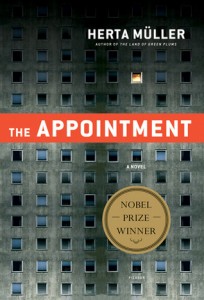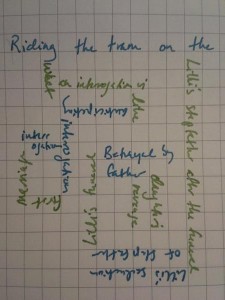 When I woke this morning, I didn’t want to pick up The Appointment by Herta Müller even though I only had a few pages left to read. I successfully avoided the book all day yesterday, too. But not for the reasons you might think. I set the book aside because it was so good, so cleanly and smartly written, that I didn’t want it to end.
When I woke this morning, I didn’t want to pick up The Appointment by Herta Müller even though I only had a few pages left to read. I successfully avoided the book all day yesterday, too. But not for the reasons you might think. I set the book aside because it was so good, so cleanly and smartly written, that I didn’t want it to end.Constructing Time
The narrator of The Appointment, a woman living under Ceauşescu’s regime in Romania, is riding a tram on her way to an interrogation with a man called Albu. The ride across town is to take two hours, and the way that the narrator digresses into flashback, I started to wonder if the trip would also take the entire book.
A teacher once told me, “If the bulk of your story takes place in flashback, you have a problem.” In almost every other case, I would agree. But here Müller has created this incredible sense of suspense that carried me through the labyrinthine back story back to the tram (as a touchstone, a grounding point) and then back into this woman’s life history again. It works because the stories are so fascinating. It works because she can be trusted to bring us back to that forward momentum of time. And it works because it conveys the stalled sense of her life under communism. If the narrator makes it to the appointment today, there will just be another in the future. There is no escape. The continuum is a circle.
I became so enthralled with the way time was working in the book that I had to start drawing it out for myself.

Teaching the Reader to Read
Another teacher told me, “The best books teach us how to read them.” The Appointment is an excellent example of this and I can see why Müller won the Nobel. The careful orchestration of time wouldn’t work if Müller hadn’t already shown us that the digressions lead somewhere. In the first few pages of the novel, she lays the groundwork of waiting for the tram and a brief look into the interrogation that waits on the other side.
Then she takes a brief step to the side to describe the routine of insomnia that precedes these interrogations. That aside evolves into a description of her life with Paul. And then a description of a label of brandy with two plums on in. I only had her to guide me, and I was willing to follow this narration because it was early in the book and I was still trying to decide if Müller was someone I wanted to follow. The narrator then gives a glimpse of her wedding to Paul (her second) and compares their faces to the two plums on the bottle of brandy. All in four pages.
That was the moment I knew that Müller was the type of writer who is laying these seemingly random details not to obfuscate, but as breadcrumbs. I knew I could trust that every detail she’d share, no matter how dizzying, would be carefully chosen and that I could trust her to bring them back around for me if only I paid close enough attention.
I was hooked and invested and I didn’t want to leave the world of the book.
Rich Characters
Then I realized that a few pages earlier, as the narrator had dipped very briefly into a memory of her father-in-law while describing the first minutes of an interrogation with Albu, Müller was also carefully setting something up. “The Perfumed Commissar” will come back later and every time we see either Albu or her father-in-law, we will think of the other. There is a relationship between the way the narrator sees the two men that enriches our understanding of each of them as individuals. When we later learn the back story of her father-in-law, it makes Albu seem even more sinister.
Müller does something similar with Lilli, the narrator’s best friend, by setting up a comparison between Lilli’s seduction of her stepfather and the narrator’s witness of her father’s adultery. These comparisons charge the text with extra meaning and they also provide contrasts to highlight where characters diverge. The narrator does have deep feelings about her father and about sex and I feared that she would mimic Lilli. What she does instead (which I won’t spoil for you here) becomes even more poignant in comparison.
Creating Order and Meaning in the World
I recently had a fantastic conversation with my husband where he told me he can see how I like to take bits of the world and digest them down into something I can understand. This distillation for me is how I create and understand order in my world. It’s how I create meaning. As a writer, drafts are my method of pruning information until I find and understand the truth hidden beneath.
One of the reasons I love writers like Müller is that I feel her process is similar. Although she drops thousands of images of daily life in Communist Romania throughout this book, and each adds to a greater feeling of life at that time in that place, I feel like the book itself is a distillation of the feeling of charged stasis.
I am glad I finished the book this morning. I am even more glad that I have the opportunity to re-open it here for you and to share with you what I love about this book and what that teaches me about myself, about writing, and about life. Next week I’ll bite off another chunk, probably Stephen Dunn’s fantastic essays on poetry in Walking Light. In the meantime, I’d love to hear more about how you process the world and about what you’re reading in the comments below.
If you can see the beauty of being trapped on a tram for the length of an entire book, pick up a copy of The Appointment from Bookshop.org. Your purchase keeps indie booksellers in business and I receive a commission.
As I was reading your review, I could see myself, pen in hand, doing the same thing as you, trying to take the structure apart to see how it all fits together. I have my preconceived notions about how narrative works and I can imagine how a book like this can challenge them. I guess I need to read it now. Thanks a lot, Isla, as if my To Read Next list is not long enough as it is 🙂
Always happy to enable a friend 🙂
I find that I try to understand things. I mean, I am genuinely interested in the “why” of things. Even if I can’t agree with or support the why, I believe this is where the story lies. The “how” is simply the sequence of events.
Anyway, I have a request:
As one of your followers, I’d like to read a post about any new authors you’d recommend. Also, how do you find them? Are they doing anything differently than, say, the masters?
Just a thought!
That’s a great request, Natasha, thanks for making it! I’ve been pretty heavy on masters lately, haven’t I? To find new authors, I read all kinds of obscure newsletters (The Review Review and Shelf Awareness are two of my favorites) and magazines (BOMB is great for this) and watch other people’s blogs. I’ve got two review copies waiting at home for new authors. One of which I think you’ll especially like (early comparisons are to Lethem’s Fortress of Solitude). This next week’s review is about poetry, but I should be able to get one of those other two up next week. I’ll think about a list, too.
In short, though, I think every author does things differently. There are generational things for sure, and sometimes you see tricks fall out of favor (especially when they start to feel like tricks) but one of my favorite things is the way individual authors of all genres remake language to suit their very own styles and messages.
Miss you!
“As a writer, drafts are my method of pruning information until I find and understand the truth hidden beneath.”
I never clearly and explicitly thought of it that way, re-writing to find out what I really meant to say. I thought I was just trying to say it better, and wasn’t paying enough attention to what “it” was. Once again, I-owe-you-yet-again.
I’m so happy I’m not the only one, Jerry!